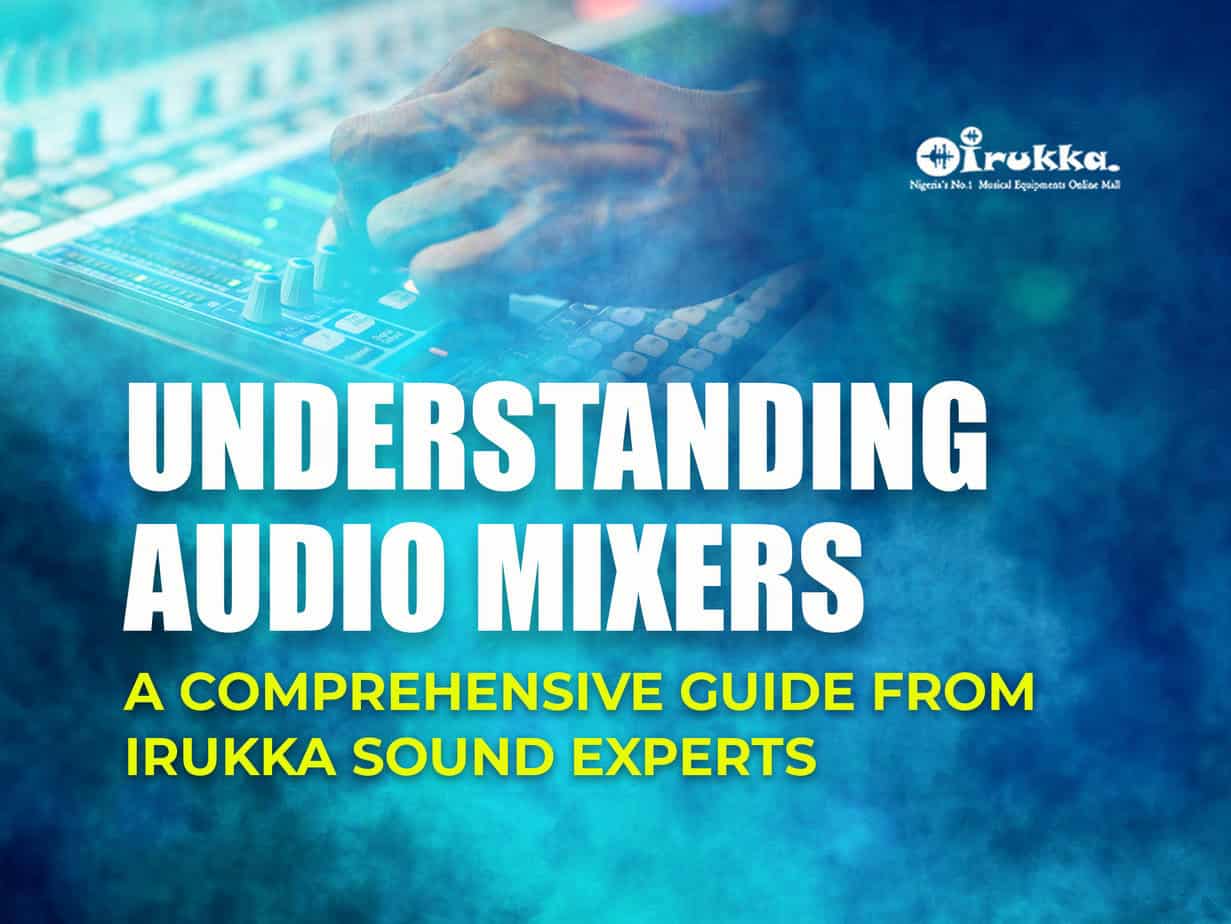Understanding Audio Mixers: A Comprehensive Guide
Table of Contents
What Does a Digital Audio Mixer Do?
What is the Difference Between DAW and Digital Mixer?
Are Digital Mixers Better Than Analog?
What Can Audio Mixers Be Used For?
What Are the Three Types of Audio Mixers?
Can I Use a Mixer Without an Amplifier?
Is an Audio Mixer an Amplifier?
Which Software is Used for Audio Mixing?
What is the Benefit of a Sound Mixer?
How Does a Digital Mixer Work?
What is the Main Use of a Mixer?
What Skills Does a Sound Mixer Need?
Introduction
Audio mixers are an essential tool in the world of sound, whether you’re an audio professional, musician, podcaster, or event organizer. In this guide, we’ll explore what digital audio mixers do, the differences between DAWs and digital mixers, and why you might choose a digital mixer over an analog one. We’ll also delve into the various uses and types of audio mixers, and the key skills needed to operate them effectively.
What Does a Digital Audio Mixer Do?
A digital audio mixer processes and blends audio signals using digital signal processing (DSP) technology. This type of mixer allows users to control volume levels, EQ (equalization), effects, and the routing of multiple audio inputs to create a balanced and polished output. Modern digital mixers often include features like built-in effects, automation, recallable settings, and integration with digital audio workstations (DAWs).
What is the Difference Between DAW and Digital Mixer?
A Digital Audio Workstation (DAW) is software used for recording, editing, and producing audio files. A digital mixer, on the other hand, is a hardware device that manages and processes multiple audio inputs in real-time. While a DAW offers extensive post-production capabilities, a digital mixer is primarily used for live sound management and real-time audio processing. However, many modern digital mixers can interface with DAWs for recording and additional processing.
Are Digital Mixers Better Than Analog?
Digital mixers offer several advantages over analog mixers:
Recallable Settings: Save and recall settings for different sessions or performances.
Built-in Effects: Access to a wide range of digital effects without additional hardware.
Compact Size: More features packed into a smaller footprint.
Flexibility: Integration with other digital equipment and software.
However, some audiophiles prefer the warm, natural sound and straightforward operation of analog mixers. The choice between digital and analog often depends on the specific needs and preferences of the user.
What Can Audio Mixers Be Used For?
Audio mixers are versatile tools used in a variety of settings:
Live Sound: Managing audio during concerts, events, and live performances.
Recording: Blending multiple audio tracks in a studio setting.
Broadcasting: Mixing audio for TV, radio, and live streams.
Podcasting: Controlling sound levels and quality during recordings.
Public Address Systems: Managing audio inputs for speeches, announcements, and other public communications.
What Are the Three Types of Audio Mixers?
The three main types of audio mixers are:
Analog Mixers: Use analog circuits to process and blend audio signals.
Digital Mixers: Use digital signal processing for audio mixing and often feature built-in effects and recallable settings.
Powered Mixers: Combine an amplifier and mixer in one unit, simplifying setup for live sound applications.
Can I Use a Mixer Without an Amplifier?
Yes, you can use a mixer without an amplifier if you’re connecting it to powered speakers or if you’re using it for recording purposes where the output goes directly to a recording device or interface. However, if you’re using passive speakers, you will need an amplifier to drive them.
Is an Audio Mixer an Amplifier?
An audio mixer is not an amplifier, but it can include built-in amplification if it is a powered mixer. Generally, a mixer’s primary function is to process and blend audio signals, while an amplifier increases the power of audio signals to drive speakers.
Who Uses Audio Mixers?
Audio mixers are used by:
Sound Engineers: For live and studio audio management.
Musicians: During performances and recordings.
Podcasters: To control audio levels and quality.
Broadcasters: For managing audio in TV and radio productions.
Event Organizers: For public address systems and live events.
DJs: For mixing tracks during performances.
Which Software is Used for Audio Mixing?
Popular software used for audio mixing includes:
Pro Tools
Ableton Live
FL Studio
Logic Pro X
Cubase
Adobe Audition
GarageBand
Reaper
Why Do I Need an Audio Mixer?
An audio mixer is essential for:
Controlling Sound Quality: Adjusting levels, EQ, and effects to create a balanced audio mix.
Managing Multiple Inputs: Blending sounds from various sources (instruments, microphones, etc.).
Enhancing Live Performances: Ensuring clear and well-balanced sound during live events.
Recording: Combining audio tracks effectively in a studio setting.
What is the Benefit of a Sound Mixer?
The benefits of a sound mixer include:
Improved Sound Quality: Fine-tuning audio levels and EQ for optimal sound.
Versatility: Handling multiple audio sources and types.
Customization: Applying effects and adjustments to create the desired audio output.
Control: Managing sound in real-time during live performances or recordings.
How Does a Digital Mixer Work?
A digital mixer works by converting analog audio signals into digital data using Analog-to-Digital Converters (ADCs). This digital data is then processed using Digital Signal Processing (DSP) to adjust levels, apply effects, and mix the audio. The processed digital signal is then converted back into analog form using Digital-to-Analog Converters (DACs) for output.
What is the Main Use of a Mixer?
The main use of a mixer is to combine and control multiple audio inputs, adjusting levels, EQ, and effects to produce a cohesive and balanced audio output. Mixers are used in live sound reinforcement, recording studios, broadcasting, podcasting, and public address systems.
What Skills Does a Sound Mixer Need?
A sound mixer needs:
Technical Knowledge: Understanding audio equipment, signal flow, and sound properties.
Attention to Detail: Ensuring audio quality and consistency.
Creativity: Applying effects and mixing techniques to enhance audio.
Problem-Solving: Quickly addressing audio issues and equipment malfunctions.
Communication: Working effectively with artists, producers, and other technical staff.
Manual Dexterity: Operating faders, knobs, and other controls smoothly.
Conclusion
Audio mixers are integral to achieving high-quality sound in various applications, from live performances to studio recordings. Understanding the functionalities and types of mixers, and knowing the skills required to operate them, can greatly enhance your audio production capabilities.
Whether you choose an analog or digital mixer, ensuring you have the right tools and knowledge will help you create the best possible audio experience.
Shop Now
Head over to Irukka Online to browse our complete collection of audio mixers and other audio equipment. With Irukka, you can trust that you’re getting the best products at the best prices, backed by expert support and fast, reliable service. Transform your audio experience today with Irukka!
Visit Irukka Today
Discover the power of exceptional sound with Irukka’s range of audio mixers. Visit our website to explore our full selection, read detailed product descriptions, and make informed decisions. Whether you’re upgrading your current setup or starting from scratch, Irukka has the right mixer for you. Shop now and experience the difference high-quality audio equipment can make.
Get the Best Audio Mixers at Irukka Online
If you’re looking to elevate your audio production capabilities, Irukka is your one-stop-shop for top-quality audio mixers. Whether you’re in the market for analog or digital mixers, Irukka offers a wide selection of the best brands and models to meet your needs. From live sound and recording to podcasting and broadcasting, our range of mixers is designed to deliver superior audio performance for any application.
Why Choose Irukka for Your Audio Mixer Needs?
- Wide Selection: We carry a diverse array of audio mixers from leading brands, ensuring that you can find the perfect mixer for your specific requirements.
- Expert Advice: Our team of audio professionals is available to help you choose the right mixer, providing guidance based on your needs and budget.
- Competitive Pricing: Enjoy the best prices on high-quality audio gear, with exclusive deals and discounts available online.
- Quality Assurance: We partner with top brands to bring you reliable and durable audio mixers that deliver exceptional performance.
- Convenient Online Shopping: Browse, compare, and purchase audio mixers from the comfort of your home, with secure payment options and fast delivery.







